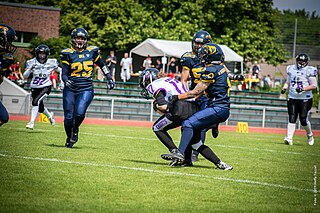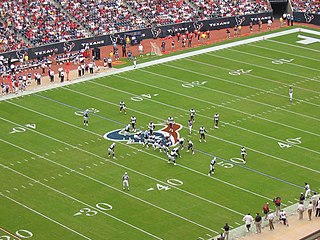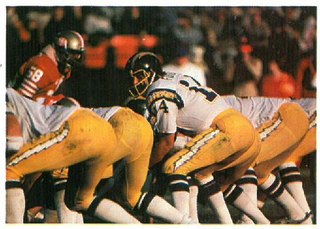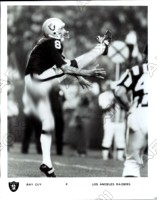A play from scrimmage is the sequence in the game of gridiron football during which one team tries to advance the ball, get a first down, or score, and the other team tries to stop them or take the ball away. Once a play is over, and before the next play starts, the football is considered dead. A game of American football consists of many such plays.

Super Bowl XII was an American football game between the National Football Conference (NFC) champion Dallas Cowboys and the American Football Conference (AFC) champion Denver Broncos to decide the National Football League (NFL) champion for the 1977 season. The Cowboys defeated the Broncos 27–10 to win their second Super Bowl. The game was played on January 15, 1978, at the Louisiana Superdome in New Orleans. This was the first Super Bowl in a domed stadium, and the first time that the game was played in prime time in the Eastern United States.

A touchdown is a scoring play in gridiron football. Scoring a touchdown grants the team that scored it 6 points. Whether running, passing, returning a kickoff or punt, or recovering a turnover, a team scores a touchdown by advancing the football into the opponent's end zone. More specifically, a touchdown is when a player is in possession of the ball, any part of the ball is in the end zone they are attacking, and the player is not down.

Gridiron football, also known as North American football, or in North America as simply football, is a family of football team sports primarily played in the United States and Canada. American football, which uses 11 players, is the form played in the United States and the best known form of gridiron football worldwide, while Canadian football, which uses 12 players, predominates in Canada. Other derivative varieties include arena football, flag football and amateur games such as touch and street football. Football is played at professional, collegiate, high school, semi-professional, and amateur levels.

A down in gridiron football is an attempt by the offensive team to run a play to advance the ball, while the defending team simultaneously attempts to halt their advance. The down is a distinguishing characteristic of the game compared to other codes of football, but is synonymous with the 6 "tackle" rule in rugby league.
In American football, a touchback is a ruling that is made and signaled by an official when the ball becomes dead on or behind a team's own goal line and the opposing team gave the ball the momentum, or impetus, to travel over the goal line, but did not have possession of the ball when it became dead. Since the 2018 season, touchbacks have also been awarded in college football on kickoffs that end in a fair catch by the receiving team between its own 25-yard line and goal line. In the 2023 season, the NFL adopted the same rules as college football in regard to awarding touchbacks on kickoffs that end in a fair catch. In 2024, the NFL moved the placement of the ball after a touchback on a kickoff to the receiving team's 30-yard line; this was part of a radical change to the league's kickoff procedure. Such impetus may be imparted by a kick, pass, fumble, or in certain instances by batting the ball. A touchback is not a play, but a result of events that may occur during a play. A touchback is the opposite of a safety with regard to impetus since a safety is scored when the ball becomes dead in a team's end zone after that team — the team whose end zone it is — caused the ball to cross the goal line.

American and Canadian football are gridiron codes of football that are very similar; both have their origins partly in rugby football, but some key differences exist between the two codes.

Gameplay in American football consists of a series of downs, individual plays of short duration, outside of which the ball is or is not in play. These can be plays from scrimmage – passes, runs, punts or field goal attempts – or free kicks such as kickoffs and fair catch kicks. Substitutions can be made between downs, which allows for a great deal of specialization as coaches choose the players best suited for each particular situation. During a play, each team should have no more than 11 players on the field, and each of them has specific tasks assigned for that specific play.
The National Football League playoffs for the 1999 season began on January 8, 2000 and included the Music City Miracle, the postseason tournament concluded with the St. Louis Rams defeating the Tennessee Titans in Super Bowl XXXIV, 23–16, on January 30, at the Georgia Dome in Atlanta.
The National Football League playoffs for the 1988 season began on December 24, 1988. The postseason tournament concluded with the San Francisco 49ers defeating the Cincinnati Bengals in Super Bowl XXIII, 20–16, on January 22, 1989, at Joe Robbie Stadium in Miami, Florida.

In American football and Canadian football, a quarterback kneel, also called taking a knee, genuflect offense, kneel-down offense, or victory formation, occurs when the quarterback touches a knee to the ground immediately after receiving the snap, thus downing himself and ending the play. It is primarily used to run the clock down, either at the end of the first half or the game itself, to preserve a lead or ensure a game goes into overtime if the game is tied and in the fourth quarter. Although it generally results in a loss of some yardage and uses up a down, it minimizes the risk of a fumble, which would give the other team a chance at recovering the ball.
The National Football League playoffs for the 2006 season began on January 6, 2007. The postseason tournament concluded with the Indianapolis Colts defeating the Chicago Bears in Super Bowl XLI, 29–17, on February 4, at Dolphin Stadium in Miami Gardens, Florida.

The 1982 San Diego Chargers season was the team's 23rd year, and 13th in the National Football League. The team had a 10–6 record in 1981. 1982 was a strike-shortened season so the league was divided up into two conferences instead of its normal divisional alignment — the Chargers finished 6–3, qualifying for the playoffs as the #5 seed. Their run ended with a second round loss to the Dolphins. This would prove the team's last playoff appearance until 1992.
In gridiron football, a turnover on downs occurs when a team's offense has used all its downs but has not advanced the ball enough to earn another set of downs. The resulting turnover gives possession of the ball to the team on defense.

In gridiron football, a penalty is a sanction assessed against a team for a violation of the rules, called a foul. Officials initially signal penalties by tossing a bright yellow colored penalty flag onto the field toward or at the spot of a foul.

In gridiron football, a punt is a kick performed by dropping the ball from the hands and then kicking the ball before it hits the ground. The most common use of this tactic is to punt the ball downfield to the opposing team, usually on the final down, with the hope of maximizing the distance the opposing team must advance in order to score. The result of a typical punt, barring any penalties or extraordinary circumstances, is a first down for the receiving team. A punt is not to be confused with a drop kick, a kick after the ball hits the ground, now rare in both American and Canadian football.
The National Football League playoffs for the 2011 season began on January 7, 2012. The postseason tournament concluded with the New York Giants defeating the New England Patriots in Super Bowl XLVI, 21–17, on February 5, at Lucas Oil Stadium in Indianapolis.
The 2022 Myrtle Beach Bowl was a postseason college football bowl game played on December 19, 2022, at Brooks Stadium in Conway, South Carolina. The third annual Myrtle Beach Bowl, the game featured the Marshall Thundering Herd of the Sun Belt Conference and the University of Connecticut (UConn) Huskies, who were not affiliated with a football conference. The bowl game was the final contest concluding the 2022 NCAA Division I Football Bowl Subdivision football season for both teams, and ended in a 28–14 victory for Marshall.

The 2022 Indianapolis Colts–Minnesota Vikings game was a National Football League (NFL) game played at U.S. Bank Stadium in Minneapolis, Minnesota, on December 17, 2022, as part of the 2022 NFL season. The Minnesota Vikings overcame a 33–0 halftime deficit to defeat the visiting Indianapolis Colts 39–36 in overtime and complete the largest comeback in NFL history. It was the third NFL/AFL game in which a team with a lead of at least 30 points failed to win after the Denver Broncos overcame a 31-point deficit to tie the Buffalo Bills in the 1960 AFL season and the Buffalo Bills overcame a 32-point deficit to defeat the Houston Oilers in a 1992 Wild Card playoff game.











